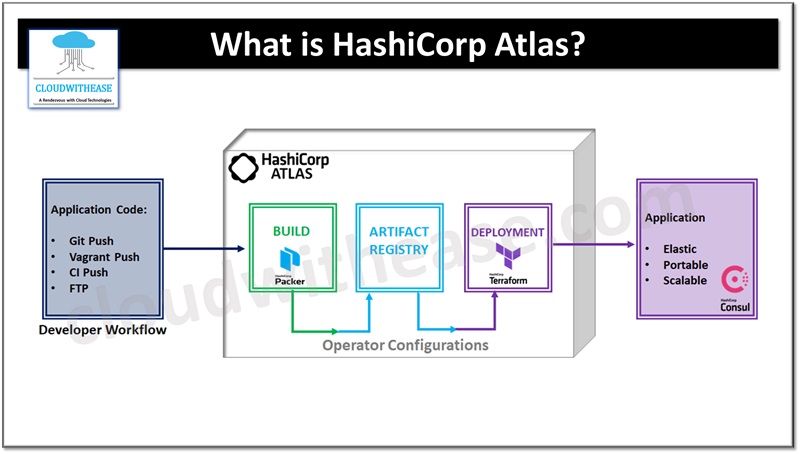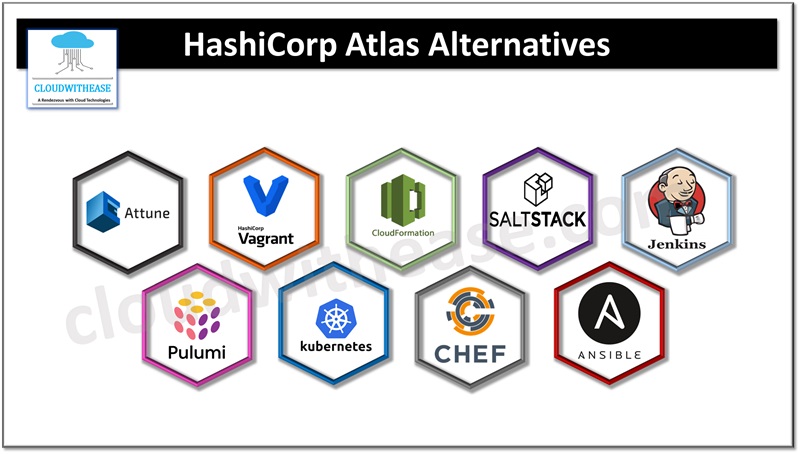Table of Contents
Just like applications, organizations want to maintain and manage the lifecycle of Infrastructure management also. However, due to deployment of complex, manual processes the infrastructure management becomes error prone, time consuming, difficult to scale.
HashiCorp Atlas is a commercially released platform which integrates open-source tools of development and operations to create a version control system for infrastructure management thus, helping organizations with an integrated tooling and collaborative workflow for both developers and operations people and help them to manage code, infrastructure provisioning and lifecycle management completely.
Today we look more in detail about the HashiCorp Atlas solution, how it works, what are the alternate solutions available other than HashiCorp Atlas?

What is HashiCorp Atlas?
Application delivery is a tedious task and becoming more and more complex with applications running on public clouds, private clouds, physical servers, virtual servers, on containers, and could be in hybrid combination of any of these. As more operations choices are available the ultimate goal is to deliver safely and consistently an application on any infrastructure.
With the cloud computing and DevOps movement application development and delivery is faster but it has its own challenges. The need is for an integrated system to reduce the complexity and make the process error resilient. HashiCorp Atlas aims to provide a single dashboard, workflow, and foundation to develop, deploy and maintain applications on any infrastructure. It is a unified interface to manage and provide visibility for servers, containers, virtual machines, configuration management, service discovery and additional operations related services. For every application in Atlas users define three things:
- Development environment
- Process for conversion of application code into deployable object
- Description of how to deploy application
The development environment can run on VirtualBox, VMware, AWS, Docker, Rocket and many more. The deployment object could be an iso image, virtual image, or container. Atlas provides a unified interface with Vagrant, Packer, Terraform and Consul.
Related: 13 Best Terraform Alternatives

HashiCorp Atlas Alternatives
HashiCorp Atlas brand is renamed as ‘Terraform Enterprise’. Let’s look at some alternatives of HashiCorp Atlas:
Attune
It is a cloud orchestration tool for launching and managing Kubernetes clusters on Azure , Google cloud and Amazon web services and also for creation of own clusters and other resources of infrastructure.
Kubernetes
It is an open-source container orchestration to manage and scale applications across several environments. It helps to simplify application development and make it scalable , it can be used with wide range of products
Chef
Chef is a continuous integration tool to automate software development. Chef uses python having automated testing and container deployment across various clouds.
Jenkins
It is a continuous delivery tool to automate software deployment and it can work across multiple programming languages. It offers automated testing, and is designed to integrate with other tools.
Saltstack
Saltstack is an automation tool for infrastructure and management of applications. It uses YAML based configuration files and easily scalable
Vagrant
It is a software development tool to setup and test applications on various configurations and operating systems. It provides support for several programming languages and frameworks. It supports many automation tools
Pulumi
Pulumi is infrastructure-as-a-code tool to automate infrastructure and deployment of applications. It has a wide range of features and supports many cloud providers such as AWS, Google cloud, Microsoft Azure.
Cloud Formation
It is a web service to help to create and manage collection of AWS related resources such as Amazon S3, Amazon EC2, Amazon RDS instances. The cloud formation template is written in JSON language. It uses templates to create and manage resources. (Related: CDK vs Terraform vs CloudFormation)
Ansible
Ansible is the most popular alternative and an open-source software to perform management and configuration of machines. It orchestrates tasks across systems using playbooks and lets you manage configurations of application environments and execution of commands on remote systems.
